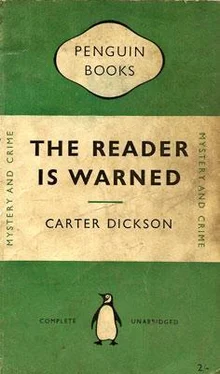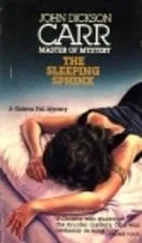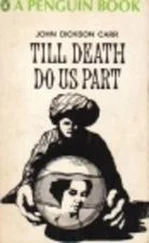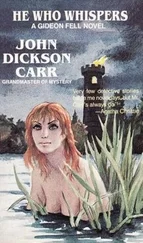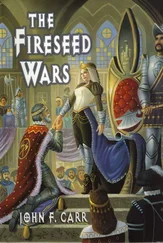John Carr - The Reader Is Warned
Здесь есть возможность читать онлайн «John Carr - The Reader Is Warned» весь текст электронной книги совершенно бесплатно (целиком полную версию без сокращений). В некоторых случаях можно слушать аудио, скачать через торрент в формате fb2 и присутствует краткое содержание. Жанр: Старинная литература, на русском языке. Описание произведения, (предисловие) а так же отзывы посетителей доступны на портале библиотеки ЛибКат.
- Название:The Reader Is Warned
- Автор:
- Жанр:
- Год:неизвестен
- ISBN:нет данных
- Рейтинг книги:3 / 5. Голосов: 1
-
Избранное:Добавить в избранное
- Отзывы:
-
Ваша оценка:
- 60
- 1
- 2
- 3
- 4
- 5
The Reader Is Warned: краткое содержание, описание и аннотация
Предлагаем к чтению аннотацию, описание, краткое содержание или предисловие (зависит от того, что написал сам автор книги «The Reader Is Warned»). Если вы не нашли необходимую информацию о книге — напишите в комментариях, мы постараемся отыскать её.
_________________
The Reader Is Warned — читать онлайн бесплатно полную книгу (весь текст) целиком
Ниже представлен текст книги, разбитый по страницам. Система сохранения места последней прочитанной страницы, позволяет с удобством читать онлайн бесплатно книгу «The Reader Is Warned», без необходимости каждый раз заново искать на чём Вы остановились. Поставьте закладку, и сможете в любой момент перейти на страницу, на которой закончили чтение.
Интервал:
Закладка:
This term had even, in fact, been applied by one of his numbers. There was a night when number eleven D'Orsay Street (junior, not the old man) was coming home from a cocktail-party at three o'clock in the morning; and number eleven D'Orsay Street had draped himself over a pillar-box and insisted on talking first about astronomy and then about the perfidious nature of woman. Having just been given the raspberry by his fiancée, number eleven was in a philosophic mood. In the course of his remarks he had called P.C. Riddle a student of human nature: just as we all, when whiffled, like to think that the person we are talking to is as profound as we are. But he had always liked number eleven afterwards; it was one more reason why D'Orsay Street, a little cul-de-sac off Mount Street, was of interest to him.
And it was the cause of a new, unpleasant interest now. Riddle knew a few names there. Number nine, for example, was a fine Regency mansion now turned into flats with incredibly steep rents. Mr and Mrs Constable, had occupied the flat on the first floor. In common with most of London, Riddle knew all about the Constable family; but he had known a little about them before the crimes whose echoes had stirred even into Mayfair.
Mrs Constable, for instance. She had several times tried to ask him questions about the police, poor lady. Once she had come bouncing down the steps into the street, bobbing along beside him, holding her hat while she tried to keep pace with him - and if there is anything your constable dislikes, it is having someone walk along the beat with him -while she poured out queries.
For several nights F.C. Riddle had been thinking about her. It is too much to say that he was haunted; he was not haunted by anything. But in the midst of the uproar, while Teleforce shouted from the newspaper bills and animated the street-corners, he always walked slowly when he passed number nine D'Orsay Street. And he thought.
He was not concerned with the investigation of crime. In fact, when once they raided a number off Curzon Street and found a gambling-house, he was startled; well as he knew the neighbourhood, he had no idea of this until he got his instructions; and he felt annoyed with the gambling-house for not knowing about it. But, again in common with most of London, he found himself groping for explanations. He didn't like to think about it; he didn't like to think about anything that disturbed him. He could not help himself.
On that gusty Wednesday night - following the inquest on the body of Mr Constable in the afternoon - his eye had been caught by a newspaper bill in Park Lane. He had not seen an evening paper; he had not had time. In a hazy way he had hoped that they would do something to this man Pennik. But the bill stared out at him in red letters.
pennik in paris
Anger stirred in P.C. Riddle's soul, stirred and spread like glue out of a bottle. So they'd let him go. So he'd be at it again. And this time Lord only knew how far the monkey would go. During near-war crises Riddle had had much the same feeling: that you couldn't trust the world at all: that in the course of only a few days you were suddenly bang against the unbelievable, with everything turning upside down.
At the mouth of Mount Street he slowed down his tread.
He was half tempted to do something he had never done’ in his life. For he had a pal who had got on: who was, in fact, a sergeant in the finger-print department of the division. Riddle was half tempted to ring up Billy Wynne (he could use the phone at number four, the chemist's) and tell him a theory which had remained stubbornly in his head for days. Of course, Billy wasn't one of the high muck-a-mucks. But he was C.I.D. anyway, and would know whom to go to. Riddle himself knew none of the high muck-a-mucks. He did happen to know one of the Yard chief inspectors, Masters, by sight; only a couple of years ago there had been a row in Lancaster Mews, near here, when the 'Ten Teacups' case blew up. Also, there was the old gentleman named Merrivale. But, on the whole, better speak to Billy Wynne and let him do it.
Ring up Billy?
No; better not. Only get a ticking-off if he did, and serve him right.
P.O. Riddle resumed his steady tread along a dim and apparently deserted street. There was a high, clear moon, and a warmish gusty wind which chased a discarded newspaper across the pavement ahead of him.
Steady growl of traffic from beyond; steady watch-tick; everything steady. It was twenty minutes to ten. Pennik in
Paris, Pennik in Paris, Pennik in Paris! Here: wasn't Pennik due to speak over Paris P.T.T. at a quarter to ten? The fruiterer at Four-b Russell Lane, the little alley only a step away, had a wireless; and it would be easy to drop in for a few minutes' listening. But better not. He had to meet his sergeant at ten; this round had to be spaced as steady as a clock.
P.G. Riddle, crushing down temptation again, kept to his regular tread and turned into the little cul-de-sac called D'Orsay Street.
Here, half-way into it, he stopped.
There was an unusual noise.
Riddle knew the proper noises of his streets as a man knows street-noises from a familiar room. Anything out of line registered in his mind seconds before he began to think about it. This was not a loud noise, but he tracked it along carefully to where the super-swank number nine thrust its heavy masonry at the moon.
Beside number nine, whose first floor-flat had been occupied by Mr and Mrs Constable, was a tall narrow gate with fancy iron grilling. Behind number nine, Riddle knew, was a deep garden enclosed by high walls; and this gate opened on a little passage leading back to the garden. The gate was now open. It clicked and rattled very slightly in the gusts of wind. Even from a distance, if you kept a sharp eye out, you could see it move. In four years of patrolling this district, Riddle had never known it to be open before.
Mr and Mrs Constable were dead, so they couldn't have opened the gate. The tenant of the ground-floor flat, to Riddle's certain knowledge, was away from home. About the tenant of the top floor, he wasn't sure; that one had been at least until recently in the south of France, and might or might not have returned. But when the top-floor tenant was at home there were always lights and sometimes sounds of revelry. Not a light showed anywhere at number nine; and the gate continued to creak.
Riddle pushed it open and walked back to the garden.
The garden was mostly grass and trees. The thin, clear moon shone down into it, throwing the back of the house into shadow. Riddle could make out that the back of the house was a staring whited sepulchre of whitewash, dingy and peeling; that each floor had a long iron balcony stretching across it, with an ornamental iron handrail and separate sets of stairs leading down, so that each tenant had access to the garden.
Keeping into shadow by the house, Riddle peered out into this garden. He saw Pennik there.
There could be no mistaking that face turned up to the moonlight, the face that had turned and stared through the newspapers in every possible combination of face and profile. A chestnut tree, new and rich with foliage, threw a dense shadow on the edge of the grass; but Pennik - his eyes on the house - moved out from under it. . He was hatless, and his face (perhaps from a trick of the moonlight) looked bloated like a drowned man's. Riddle saw him slide his hand into his pocket and draw something out. Despite the vast whisper of wind in foliage, all sounds were whittled down to such a fine point that- Riddle distinctly heard the click, and saw moonlight run along the blade, as Pennik pressed the button of the clasp-knife.
Then Pennik, slipping the open knife into his pocket, moved out softly towards the house.
P.C. Riddle moved with him - sideways in shadow as Pennik-moved forward. When Pennik put his foot on the first step of the iron stairway, Riddle was close enough to breathe on him. He almost put his hand on Pennik's as the latter took hold of the hand-rail. But Riddle did not do that; he waited until Pennik was half a dozen steps up, and followed.
Читать дальшеИнтервал:
Закладка:
Похожие книги на «The Reader Is Warned»
Представляем Вашему вниманию похожие книги на «The Reader Is Warned» списком для выбора. Мы отобрали схожую по названию и смыслу литературу в надежде предоставить читателям больше вариантов отыскать новые, интересные, ещё непрочитанные произведения.
Обсуждение, отзывы о книге «The Reader Is Warned» и просто собственные мнения читателей. Оставьте ваши комментарии, напишите, что Вы думаете о произведении, его смысле или главных героях. Укажите что конкретно понравилось, а что нет, и почему Вы так считаете.
